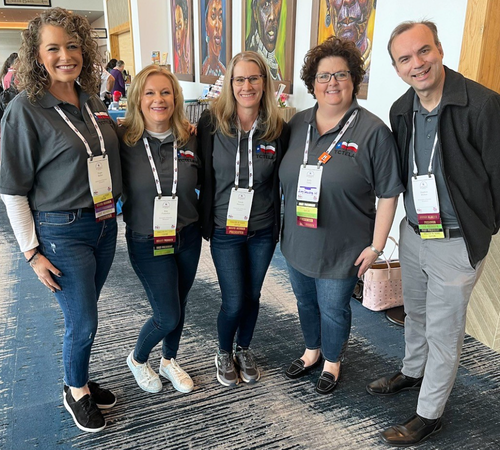For the past three years, University of Houston–Downtown faculty members Dr. Diane Miller, Dr. Stephen Winton, and Dr. Sarah Albrecht have helped shape conversations in English education through their leadership on "English in Texas," an award-winning, peer-reviewed journal published by the Texas Council of Teachers of English Language Arts.
Serving together as the editorial team, the three faculty members, along with Dr. Kim Pinkerton and Kelly Tumy, have guided the journal through an exciting period of growth and innovation. Under their leadership, "English in Texas" has continued its mission to support teachers, researchers, and scholars in advancing literacy education statewide.
What falls under the umbrella of literacy education is quite broad. “Literacy really spans pretty much any subject area,” Dr. Albrecht, Assistant Professor of Bilingual Education, explained. “Our audience is teachers of English language arts, but really, if you're thinking in terms of literacy instruction, then virtually any instructor is going to be involved in some way in the instruction of literacy or the development of their students’ literacy.”
During their three-year term, which ends soon, the team revamped the journal’s columns section—a feature that gave many educators and budding academics their first opportunity to publish in a professional journal.
Dr. Winton, Assistant Professor of Literacy, touched on the journal’s thoughtful approach toward giving contributors the freedom to write on meaningful topics while keeping the focus tight on English language arts. They also strove to help writers find a balance between the practice of teaching and the observable outcomes with students. “The two really go hand in hand. Some of the most common feedback we give authors is, ‘Offer practical examples of classroom teaching and reflect on how the practices support positive student outcomes.’”
Dr. Miller, Professor of Literacy and lead editor of the journal, noted that the columns also deepened the journal’s connection to educators across Texas. “So much of what has been going on with public education lately reflects the deprofessionalization of teachers,” she noted. “At each conference during our editorial term, we would go and visit teachers doing their sessions and say, ‘Hey, what you have to say matters. We loved what you just said. Let's hear more of it, and let's put it into a format that can exist in perpetuity.’”
That spirit of collaboration extended to the editorial process itself. The team worked closely to review submissions, guide revisions, and shape each issue’s focus. Furthermore, the editors received guidance from a previous UHD "English in Texas" team comprising now-former UHD faculty Dr. Lee Van Horn, Dr. Carol Bedard, and Dr. Kim Pinkerton. Dr. Pinkerton joined the new team and, having kept all her notes from her original term, drastically eased the transition.
The editors’ efforts were recognized within the field, earning "English in Texas" an award for editorial excellence from the National Council of Teachers of English for the second year in a row. Next year, their work on the 2025 journal will once again be eligible for this honor.
As the team’s editorial term comes to an end, each faculty member is moving forward with new projects while carrying forward lessons learned from the experience. Dr. Winton will continue his research on teacher clarity and literacy education, with an article exploring an instructional framework on small-group reading interventions in the works, co-authored with Dr. Miller and other colleagues. Dr. Miller is in an exciting transition period, having not only earned a promotion to Professor but also assumed the Interim Associate Dean position for the College of Public Service for the past year and a half. And Dr. Albrecht has several research projects in the works, all pertaining to biliteracy. Her book "Pedagogical Translation," which explores a powerful but underutilized bilingual teaching tool, will be published next year.
Reflecting on their time with the journal, all three editors expressed pride in the community it helped build. “[Working on "English in Texas"] confirmed and increased my respect for the dedication and the professionalism of some of the educators that are out there,” Dr. Albrecht said. “And it reaffirmed the importance of having space for those voices, the recognition of educators in Texas.”

